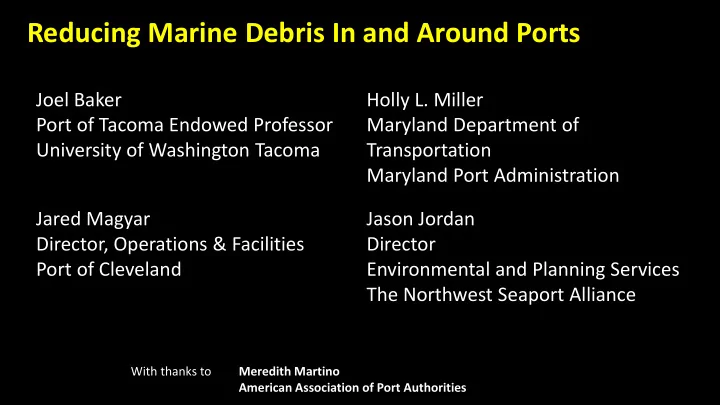

Reducing Marine Debris In and Around Ports Joel Baker Holly L. Miller Port of Tacoma Endowed Professor Maryland Department of University of Washington Tacoma Transportation Maryland Port Administration Jared Magyar Jason Jordan Director, Operations & Facilities Director Port of Cleveland Environmental and Planning Services The Northwest Seaport Alliance With thanks to Meredith Martino American Association of Port Authorities
Reducing Marine Debris In and Around Ports Marine Debris: A Global Problem with Local Solutions Joel Baker Port of Tacoma Endowed Professor University of Washington Tacoma
Marine Debris: Some Definitions Size Meters Navigation hazards Centimeters Entanglement/choking Sub-centimeters Ingestion, invasive species vectors (Microplastics)
Marine Debris: Some Definitions Composition Natural (woody debris) Degradable (paper, cloth) Persistent (plastics, foams, monofilaments)
Marine Debris: Some Definitions Sources At sea vessels Illegal discharge, food grinders ‘lost’ fishing gear Natural disasters Tsunamis, hurricanes, floods Manufacturing Flow injection pellets, machining Abrasives Sand blasting, cleansers, cosmetics
Crest Toothpaste
Marine Debris: Why do we care? A. Aesthetics Kanapou Bay, on the Island of Kaho'olawe in Hawaii Source: NOAA Marine Debris Program
Marine Debris: Why do we care? B. Entanglement and Ingestion www.worldwildlife.org
Marine Debris: Why do we care? C. Possible (but unconfirmed) affects on food webs M.A. Browne et al .; Environ. Sci. Technol. 2008, 42, 5026-5031.
Marine Debris: Why do we care SO MUCH about plastic? Public concern outpaces quantifiable risks Permanent Petroleum-Based Visable Synthetic Industrial
World Economic Forum (2016)
World Economic Forum (2016)
Plastics in the Marine Environment • Plastic packaging generates significant negative externalities, conservatively valued by UNEP at $40 billion and expected to increase with strong volume growth in a business-as-usual scenario. • Each year, at least 8 million tonnes of plastics leak into the ocean. • If no action is taken, this is expected to increase to two per minute by 2030 and four per minute by 2050. • Plastic packaging represents the major share of this leakage. Source: World Economic Forum, 2016
Plastics in the Marine Environment There are over 150 million tonnes of plastics in the ocean today. In a business-as-usual scenario, the ocean is expected to contain 1 tonne of plastic for every 3 tonnes of fish by 2025, and by 2050, more plastics than fish (by weight). Source: World Economic Forum, 2016
Rapid Increase in Published Studies of Marine Microplastics (Microplastic OR Plastic) AND (Marine OR Ocean) 500 Number of Published Papers 450 400 350 300 250 200 150 100 50 0 1960 1970 1980 1990 2000 2010 2020 Year
Solving the Problem: At Sea Clean-up?
Solving the Problem: Breaking the Supply Chain Enhanced recycling/reuse Degradable polymers Education But in the meantime….
Solving the Problem: Breaking the Supply Chain The largest source of marine debris is most likely litter and other types of improper disposal along coastlines, rivers and harbors.
Marine Microplastics Supply Chain Disintegration Dispersal Accumulation
Solving the Problem: Breaking the Supply Chain MarineScienceToday.com This works!
Reducing Marine Debris In and Around Ports Joel Baker Port of Tacoma Endowed Professor University of Washington Tacoma jebaker@uw.edu
Reducing Marine Debris In and Around Ports Jared Magyar Director, Operations & Facilities Port of Cleveland
Reducing Marine Debris In and Around Ports Holly L. Miller Maryland Department of Transportation Maryland Port Administration
Reducing Marine Debris In and Around Ports Jason Jordan Director Environmental and Planning Services The Northwest Seaport Alliance
Recommend
More recommend